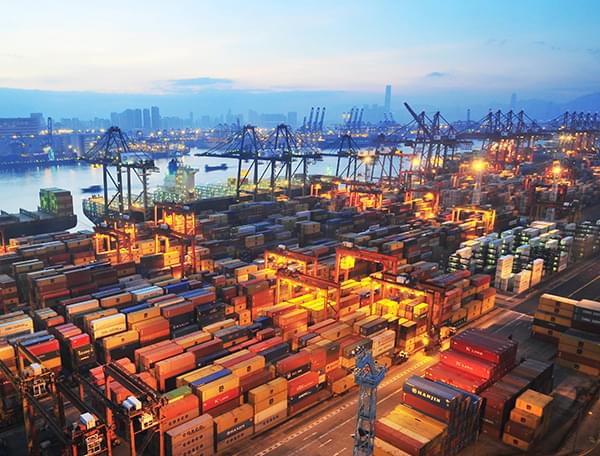- Descripción generalProductos
Mediante la comprensión de la luz y el sonido, se crean soluciones de Seguridad eficientes y fiables.
Desarrollamos productos de señalización para sitios industriales y entornos peligrosos para aumentar la productividad. Desde los puertos hasta las minas, desde las fundiciones hasta los edificios altos, desde las autopistas hasta los buques oceánicos, nuestros investigadores se han comprometido a proporcionar seguridad y estabilidad en entornos industriales exigentes mediante el diseño de iluminación.
 Luces de Obstrucción
Luces de Obstrucción Luz de obstrucción de aviación simple de baja intensidad LED YOL32
Luz de obstrucción de aviación simple de baja intensidad LED YOL32 Baliza Solar de Obstrucción YSL10
Baliza Solar de Obstrucción YSL10 Luz de obstrucción de aviación simple de baja intensidad LED YOL10
Luz de obstrucción de aviación simple de baja intensidad LED YOL10 Luz de obstrucción de aviación simple de baja intensidad LED YO100
Luz de obstrucción de aviación simple de baja intensidad LED YO100 Señalización e Iluminación Baliza YOL-E27
Señalización e Iluminación Baliza YOL-E27 Baliza Media Intensidad YML2000B
Baliza Media Intensidad YML2000B Baliza Media Intensidad YML2000C
Baliza Media Intensidad YML2000C Luz de obstrucción dual roja blanca de intensidad media
Luz de obstrucción dual roja blanca de intensidad media Luz de obstrucción doble YSL10D
Luz de obstrucción doble YSL10D Baliza Solar de Obstrucción YSL32
Baliza Solar de Obstrucción YSL32 Baliza Solar de Obstrucción YSL50
Baliza Solar de Obstrucción YSL50 Luz de obstrucción de intensidad media con energía solar YSL2000
Luz de obstrucción de intensidad media con energía solar YSL2000 Luz de obstrucción de intensidad media con energía solar YSL2000A&B
Luz de obstrucción de intensidad media con energía solar YSL2000A&B Luz de obstrucción de alta intensidad de la aviación de YHL200000
Luz de obstrucción de alta intensidad de la aviación de YHL200000
Iluminación de Helipuertos - Nuestro proceso

- Descripción generalAplicación
Los productos de alta calidad se utilizan ampliamente en señales de edificios altos, señales de Torres de telecomunicaciones, señales de obstáculos de carretera, ayudas a la navegación, puertos, entradas y pasarelas de muelles, señales de boyas, plataformas petrolíferas y de gas en alta mar, luces de helipuerto, luces de pista, etc.
 Ayudas visuales marítimasLuces de obstruccióniluminación LED de helipuerto
Ayudas visuales marítimasLuces de obstruccióniluminación LED de helipuerto - Descripción generalServicios
Uno de los elementos básicos de la gestión de las relaciones con los clientes, que puede ayudar a las empresas a satisfacer las necesidades únicas de los clientes con mayor velocidad y eficiencia.
 Política de servicios posventaServicio personalizadoFAQ
Política de servicios posventaServicio personalizadoFAQ - Descripción generalNoticias
Centro de noticias en línea, rodando la información educativa más reciente todos los días, viendo los puntos calientes de la educación en profundidad, incluyendo comentarios educativos, listas de noticias educativas calientes, columnas de entrevistas en profundidad, informes especiales, etc., mostrando puntos de vista de la educación omnidireccional y multi - ángulo
 Noticias de la empresa
Noticias de la empresa Notificación de la reanudación de la producción tras un brote de virusReanudación de la producción
Notificación de la reanudación de la producción tras un brote de virusReanudación de la producción Sistema de Linterna marina remota de aplicacionesLejos de la Linterna marina ML860, Las luces de obstrucción de la aviación y el sistema Internet de las cosas pueden ser monitoreados y configurados remotamente a través de aplicaciones móviles o PC. (puede registrar la curva de tensión de la batería, el desplazamiento de posición, la alarma de fallo en los últimos 7 días... Puede configurar 256 modos de parpadeo, modos manuales y automáticos, intensidad de luz, control de grupo, sincronización GPS...).
Sistema de Linterna marina remota de aplicacionesLejos de la Linterna marina ML860, Las luces de obstrucción de la aviación y el sistema Internet de las cosas pueden ser monitoreados y configurados remotamente a través de aplicaciones móviles o PC. (puede registrar la curva de tensión de la batería, el desplazamiento de posición, la alarma de fallo en los últimos 7 días... Puede configurar 256 modos de parpadeo, modos manuales y automáticos, intensidad de luz, control de grupo, sincronización GPS...). Nuevos clientes de Logic. Ven a visitarnos juntos.Nuevos clientes de Logic. Ven a visitarnos juntos. Estamos muy interesados en nuestros productos de iluminación de obstáculos aéreos.
Nuevos clientes de Logic. Ven a visitarnos juntos.Nuevos clientes de Logic. Ven a visitarnos juntos. Estamos muy interesados en nuestros productos de iluminación de obstáculos aéreos. aviation obstruction lights PCB by SMT ProcessAll our products adopt SMT Process, which can save electric energy, save manpower, improve efficiency, reduce cost, improve appearance quality and reliability, overcome human influence factors, and ca...
aviation obstruction lights PCB by SMT ProcessAll our products adopt SMT Process, which can save electric energy, save manpower, improve efficiency, reduce cost, improve appearance quality and reliability, overcome human influence factors, and ca...
Tendencias de la industria Kit de luces de obstrucción de la torreMaterial del kit de luces de obstáculos de la torre
Kit de luces de obstrucción de la torreMaterial del kit de luces de obstáculos de la torre The decline in orders from foreign trade enterprises has shifted to epidemic prevention suppliesRecently, the epidemic has been severe overseas, and domestic foreign trade enterprises have also been impacted to some extent. Reporters learned that foreign trade enterprises orders fell significant...
The decline in orders from foreign trade enterprises has shifted to epidemic prevention suppliesRecently, the epidemic has been severe overseas, and domestic foreign trade enterprises have also been impacted to some extent. Reporters learned that foreign trade enterprises orders fell significant... customer visitvist ou factory!
customer visitvist ou factory! What can foreign trade business owners do during the period of epidemic prevention and control?What can foreign trade business owners do during the period of epidemic prevention and control
What can foreign trade business owners do during the period of epidemic prevention and control?What can foreign trade business owners do during the period of epidemic prevention and control
- Descripción generalSobre nosotros
Hunan yuansheng Electronic Technology Co., Ltd. Es un fabricante chino de luces de obstrucción aérea,Luces de Obstrucción, luces de navegación marina,Linterna marina LED, Iluminación de Helipuertos.
 Perfil de la empresaSocios cooperativosCertification
Perfil de la empresaSocios cooperativosCertification - Descripción generalContáctanos
La comunicación es un proceso de transmisión y retroalimentación de pensamientos y sentimientos entre personas y grupos, con el fin de llegar a un acuerdo sobre pensamientos y sentimientos.
 Contáctenos
Contáctenos

 es
es cn
cn en
en pt
pt fr
fr ar
ar ru
ru























